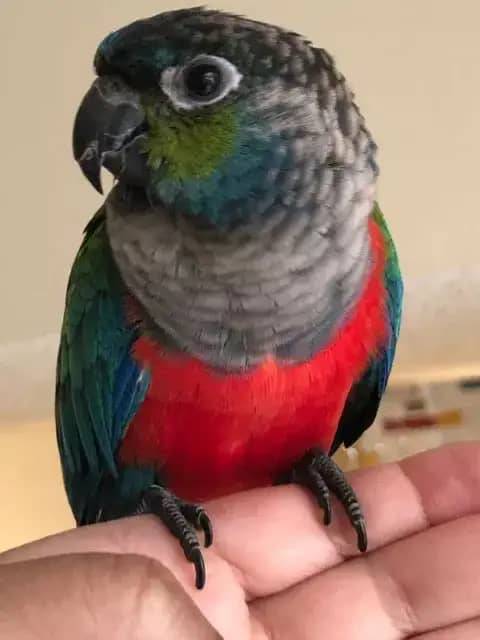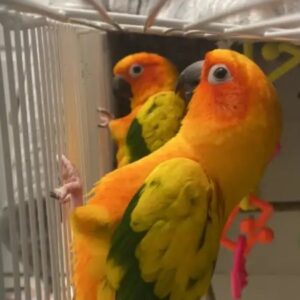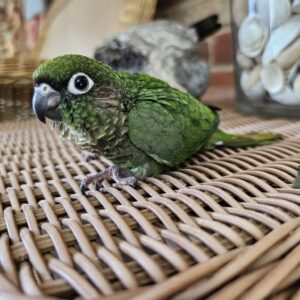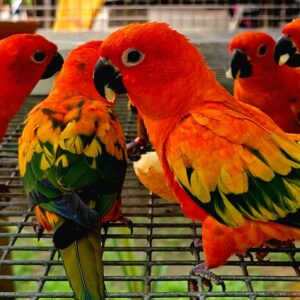Description
Crimson Bellied Conure For Sale
Crimson-bellied Conures are generally quiet and they are usually only vocal when excited. They quickly grow confiding. These are lively and active conures that enjoy flying about, so plenty of space should be provided. They tend to be hardy and are not as susceptible to diseases as some other bird species are, especially when provided good nutrition and suitable environment. They enjoy bathing often. The chewing requirement varies from pair to pair. It is important to provide a regular supply of fresh branches to satisfy their chewing urges as well as to provide entertainment. They are not usually aggressive to other birds.
The vividly colored Crimson-bellied Conure is a playful bird, and can easily be trained to do tricks and maybe even to speak a few words. Even though Crimson-bellied Conures are comparatively quieter than other conures
Crimson-bellied Conures are also popular among pet owners due to their stunning red chest, abdomen and under coverts of wings. They have a greenish-blue back a red tail, dark beak and feet and scaling on the neck. Yellow or green cheeks, with blue tinges on the face, head, neck, and blue on the legs and vent area.
This species of birds make excellent pets. They are slightly more independent and dominant than the Green-Cheeks, but if you can put up with their attitude, they are one of the most comical conures out there. They can learn to talk moderately, and imitate sounds and other calls.
Sexing: Determinable by appearance. Males and females look alike, needs an experienced expert or DNA
Size: 9.5 inches or 24 cm in length
Adult Weight: 2.8 - 3.3 oz (79 - 94 grams)
Average Lifespan: 20 years
Their calls - contact and those made in flight - are loud and shrill
They should be provided with plenty of fruit, vegetables and greenfood; as well as a regular supply of branches with flowers and buds. A good quality seed mix of safflower, oats, some sunflower, hemp, buckwheat, millets, canary seed and rowan berries should be available at all times. They also enjoy millet spray and should have access to mineral and vitamin supplements.
Care & Diet of Pet Crimson Bellied Conures
Conure parrots, are delightful little birds that are colorful and full of character. Hand reared conures make excellent pets and are extremely popular with bird lovers all around the world. Some of the more popular, and readily available types of conures kept as pet birds, include the following: Sun Conure, Jenday Conure, Nanday Conure, Blue Crowned Conure, Maroon Bellied Conure, Green Cheeked Conure, Peach Fronted Conure, Dusky Headed Conure, Red Masked Conure, and the Patagonian Conure.
Conure Care
Conures are active birds, and consequently conure bird cages need to be fairly large relative to body size, fitted with lots of toys, especially things to chew, and noisy toys like bells and rattles, to provide stimulation and prevent boredom. As they are intelligent birds that love to interact and play, it is easy to train all types of conures to perform tricks. They will readily lie upside down in the palm of your hand and play dead. They also love water, and it is recommended that a bird bath be provided – alternatively a spray shower in hot weather will always be appreciated.
Conure Diet
A balanced diet of whole grains, fruit, vegetables, seeds and nuts is recommended for all types of conures to ensure that they remain in good health. Feed commercial seed and pellet mixes together with a variety of fresh fruit and vegetables. Conures love apple, corn on the cob, sprouted seeds, as well as a cooked mix of corn and peas, such as the mixes available for pigeons. Foods to avoid include chocolate, alcohol, onions and avocado pear, which is highly toxic to parrots.
Personality & Behavior
Conures can be very playful, very cuddly and, at times, very loud. A conure is more inclined to be curious and bold instead of shy and cautious. Conures are active and busy birds that need plenty of toys and other forms of enrichment to keep them happily occupied throughout the day. A conure can make a great family pet because of its playful and outgoing personality. In a family situation, children should be taught how to respectively interact with the conure, including proper handling and not forcing interaction. A conure loves to be where its people are or on them; even going so far as to climb under their owner’s shirt, head poking out of the collar, during cuddle time. Some conures will dance back and forth, and might even mimic its person’s movements. Conures can also be taught to perform tricks on cue if trained using positive enforcement.
Speech & Sound
A conure’s signature sound is a high-pitched screech, which is often emitted when the bird is excited, startled and/or when it wants attention. Many owners make the mistake of inadvertently reinforcing a conure’s screech by running over to the cage or otherwise giving the bird direct attention whenever it begins to screech. Conures are capable talking and, although their vocabularies are not as extensive as that of other parrot species, they can learn to speak a few words and phrases.
Health & Common Conditions
Conures can be prone to feather picking. If a complete medical exam rules out medical causes of feather plucking, boredom and/or lack of appropriate mental stimulation can be a cause. Offer your conure an enriched environment with plenty of opportunities for play and exercise, as well as a staple supply of safe items to chew. Conures are also susceptible to Proventricular Dilatation Disease (PDD), Psittacine Beak and Feather Disease, Psittacosis, beak malocclusion and Aspergillosis. Regular health checkups by an avian veterinarian are crucial to your conure’s health, as they can help diagnose and treat many disease processes early on.
Experience Level: Intermediate
Expected Size: Conures grow up to 15 inches (38 cm) from head to end of tail.
Lifespan: Conures can live as long as 20 years.
Behavior: Conures have playful personalities and can be noisy.
Temperament: They need at least an hour of daily interaction with their pet parents.
Vet Assured: Pets purchased at Fertile Macaw Parrot Eggs For Sale are part of our exclusive Vet Assured program, designed by Fertile Macaw Parrot Eggs For Sale veterinarians to help improve the health and well-being of our pets. Our vendors meet a high standard in caring for pets and screening them for common illnesses, including Zoonotic diseases. This program also includes specific standards for in-store pet care.
The Fertile Macaw Parrot Eggs For Sale Promise: If your pet becomes ill during the initial 14-day period, or if you’re not satisfied for any reason, Fertile Macaw Parrot Eggs For Sale will gladly replace the pet or refund the purchase price.




Reviews
There are no reviews yet.